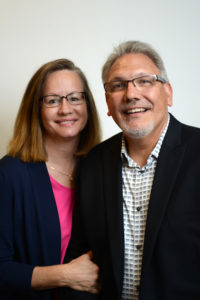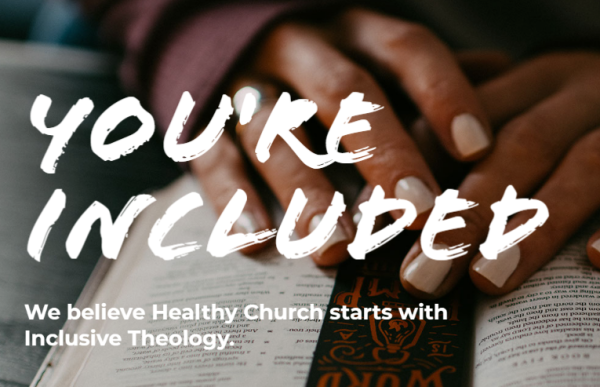In his 2017 article, “Clarifying Our Theological Vision,” Dr. Deddo writes:
This theological declaration is based on the biblical revelation that Christ died for all, and that God has loved and reconciled the world to Himself (Rom. 5:18; 2 Cor. 5:14; John 3:16; 2 Cor. 5:19, Heb. 2:9). Jesus is “the lamb of God who takes away the sins of the world” (John 1:29), and He is the “ransom” for all (1 Tim 2:4, 6; 4:10; Matt. 20:28). Because this reconciliation is accomplished, and thus a present reality, God’s desire, which is fulfilled by the ongoing ministry of the Holy Spirit, is for all people everywhere to come to repentance and faith so they may personally experience (receive and live into) this reconciliation and so not perish (2 Pet. 3:9; Ezek. 18:23, 32). Thus, when we declare that all are included, we are affirming several important truths:
-
-
-
-
- Jesus Christ is Lord and Savior of all humanity.
- He died to redeem all.
- He has atoned for the sin of all.
- Through what He did, God reconciled all people to Himself.
- Jesus is the mediator between God and all humanity.
- He has made all his own by virtue of his redeeming work.
- He is for all and against none.
- He is judge of all, so that none might experience condemnation.
- His saving work is done on behalf of all, and that work includes His holy and righteous responses to the Father, in the Spirit — responses characterized by repentance, faith, hope, love, praise, prayer, worship, and obedience.
- Jesus, in Himself, is everyone’s justification and sanctification.
- He is everyone’s substitute and representative.
- He is everyone’s hope.
- He is everyone’s life, including life eternal.
- He is everyone’s prophet, priest, and king.
(I encourage you to read the complete article by Dr. Deddo. There is a great introduction by our friend, Dr. Joseph Tkach, as well.)
When we say, Jesus has done it all, we really mean that. However, to experience union with Christ through the Spirit, we are talking about an interactive relationship that involves response, communication, giving, and receiving. Ultimately, a relationship with Jesus means participation. This is why the apostle John says, “But to all who received him, who believed in his name, he gave power to become children of God.” (John 1:12 NRSVA) Becoming a new creation in Christ has depth and breadth of understanding, as well as active relationship that displays a level of truly receiving and participating with Christ. It signifies the image-bearer of the Creator now coming into union with Jesus through the power of the Spirit.
It is important that our understanding about inclusion follows what we see in biblical revelation, otherwise we can fall into a “lazy theology” that is governed by our personal feelings, desires, or social and cultural influences. It is equally important that we maintain a prayerful, hopeful posture that Paul expresses so well in the closing verses of Ephesians.
For this reason I bow my knees before the Father, from whom every family in heaven and on earth takes its name. I pray that, according to the riches of his glory, he may grant that you may be strengthened in your inner being with power through his Spirit, and that Christ may dwell in your hearts through faith, as you are being rooted and grounded in love. I pray that you may have the power to comprehend, with all the saints, what is the breadth and length and height and depth, and to know the love of Christ that surpasses knowledge, so that you may be filled with all the fullness of God. Now to him who by the power at work within us is able to accomplish abundantly far more than all we can ask or imagine, to him be glory in the church and in Christ Jesus to all generations, for ever and ever. Amen. (Ephesians 3:14-21 NRSVA)
This prayer of Paul is so beautiful in that it displays the inclusion of humanity in the Father, from whom all earthly families take their name. Then it takes it further to Jesus’ dwelling in the hearts of His children with a permanent faith and an experiential comprehension of His unfailing love. So, we pray to the triune God vigorously requesting that He draws all His children into a relationship of union with Jesus Christ, Lord and Savior of all!
Included and in union with Christ,
Greg Williams
P.S. On October 29, 2024, torrential rain brought over a year’s worth of precipitation and historic floods to several areas in southeastern Spain. Pedro Rufian, our ministry leader in Spain, has confirmed that none of our members or their families have been directly affected by the flooding. Please pray for Spain and all those suffering.





Thank you, Greg. All of us are fellow humans, created in God’s image. Jesus enables me to see how he includes all nationalities, races, and cultures, forgiven and reconciled to our Triune God, through him. I’m grateful to be one of the innumerable multitudes drawn to him on his Cross.
Thanks much for this contribution focusing on “inclusion theology”. Our fellowship has been through many struggles, the result being a better understanding of the gospel’s beauty in the person of Christ and what this means for all of humanity. May we continue to be open to the lead of the Holy Spirit.
God’s definition of “all” is not “every human being.” God’s definition of “all” is His Elect only. Humans are not born with the ability to believe that Jesus is Christ. What do you think the “born again” process Jesus describes in Jn 3:3 – 5 is all about?
Well said. In summary: There is a difference between belief and trust. Belief is a gift from our Father; trust is what is developed by a lifetime of walking and talking with our Lord. Peter was given the knowledge that Jesus was the Son of God. But his trust was in its infancy as he found out when he took a step or two on the water.
Thanks Greg for reminding us of this vital clarification in our theology. The whole goal and purpose of the hypostatic union was to make it possible for mankind to enter into a spiritual union with the father and son through the holy Spirit.
Thanks Greg for the helpful scriptures and your thoughts about inclusion theology. I agree with this statements and the bible says clearly, that Jesus has given a perfect sacrifice. God really desires and longs for every person on earth that he accepts in a specific time of being called out of the world to come and live a live according to Gods will.